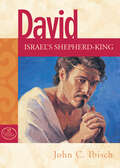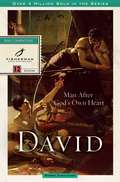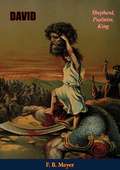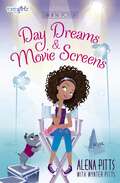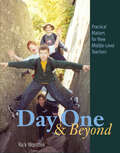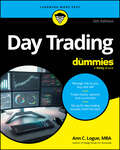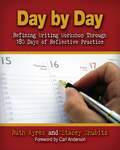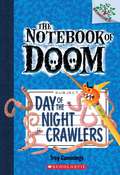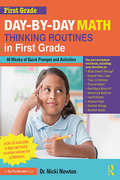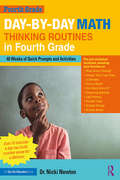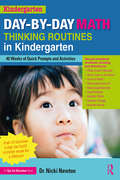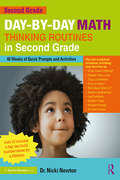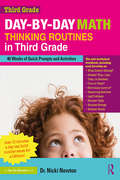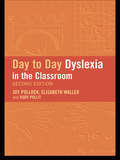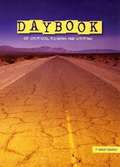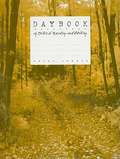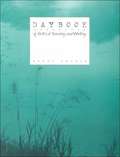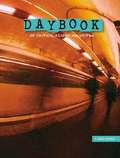- Table View
- List View
David: Israel's Shepherd-King (God's People)
by John C IbischWho was David from the Bible?David filled many roles: shepherd, warrior, hero, poet, and king. But he was also a liar, murderer, deceiver, and adulterer.Riddled with disappointment, the story of Israel’s shepherd-king strikes home because, like us, David was only human. In David, we see a man whose only recourse was to trust in God for comfort, strength, and deliverance.In this captivating retelling of David’s life, you will also meet several characters who left marks in the history of this shepherd-king: the prophet Samuel, the giant Goliath, King Saul and his son (Jonathan) and daughter (Michael), Bathsheba, and the prophet Nathan.If you’re wondering who David was, or want to know how David’s faith journey impacts your own, this book is for you!David: Israel’s Shepherd-King is part of the God’s People series by Northwestern Publishing House. It’s a wonderful collection about the lives and times of some of God’s chosen people. Plots and settings have been taken directly from the Bible, and each book features beautifully detailed, full-color illustrations.
David: Man after God's Own Heart (Fisherman Bible Studyguide Series)
by Robbie CastlemanKnow God as David Knew Him David--impetuous, sensitive, bold, poetic, compassionate, utterly human. What can we learn from this young warrior-king of long ago? And how could God call David a "man after his own heart" even though he was a "man of blood" and an adulterer? Though David sinned greatly, he also loved greatly. By observing and learning from David's character and action, we too can become God's kindred spirits, men and women "after God's own heart."12 SESSIONS FOR INDIVIDUALS OR GROUPSFisherman Bible Studyguides include: Penetrating questions that generate discussionFlexible format for group or individual needsHelpful leader's notesEmphasis on daily application of Bible truth
David: Shepherd, Psalmist, King
by F. B. MeyerKing David fulfilled many roles in his eventful life: shepherd, psalmist, prophet, rebel, king. Focusing on the events that led a lowly shepherd boy to become the King of Israel, F. B. Meyer’s exploration of the life of David weaves narrative detail with spiritual application. This devotional biography underscores the many ways David’s story anticipates the life of Jesus Christ—the Son of David.-Print ed.
Dawn Over Temple Roofs
by Lucy StarlingOriginally published in 1960, Dawn Over Temple Roofs tells the enlightening story of the First Protestant Missionary to Thailand, from their very first arrival in 1828, through to the merger of the Mission with the national Church in 1957.The book includes the following chapter titles: How it all Happened. Off to the North. A Perfect Breakfast. Pioneer Doctor. The First Language Lesson. Village Touring. Princes and Persecution. The Wrath of Men and of Spirits. Spying out the Land. Lengthening the Cords. Thrust to the East. Rivers Run South. A Decade in Muang Nan. No Clocks in the Forest. Circling the Globe. Peaceful interlude in Chiang Mai. A Boy and an Elephant. Siam all same Little China. Two Decades in Muang Lampang. Happy Victory. Mountain Rest. White Elephant and Rising Sun. Return of the Missionary. The Paths of Peace. The Prophetic Vision.An invaluable addition to any devotee’s collection
Day Dreams and Movie Screens (Faithgirlz / Lena in the Spotlight)
by Alena Pitts Wynter PittsEleven-year-old Lena Daniels’ summer of Hollywood starlets and movie filming alongside her favorite singer, Mallory Winston, is over. School will be back in full swing, and it seems as though life might just pick up where it left off—with volleyball games, homework, and her best friends. But just as she begins to wonder if her summer was all just a dream, her world is turned upside down . . . again! The movie [movie title to be added] premiers, the previews seem to be splattered on every television and radio channel, and everyone knows her name. Her classmates, strangers, and even her friends are starting to treat her differently, and everywhere she turns she’s being asked for an autograph, a picture, or a hug.Lena is just figuring out how to manage her new fame at home when she finds out she's hitting the road on a two-week bus tour to further promote the film. Traveling across the country with the cast—with the surprise addition of her whole family joining them—Lena experiences adventures and challenges she never expected, while learning to step outside of her comfort zone and follow the path God has for her life. She learns that saying yes to God may not always be easy, but will take her further than she ever imagined!This Faithgirlz series entitled Lena in the Spotlight, written by Alena Pitts, star of The War Room and tween blogger of For Girls Like You, and co-written with her mother, editor and author, Wynter Pitts, is a reflection of Alena’s own life experiences as she reaches for the stars and keeps her faith in balance.
Day One and Beyond: Practical Matters for New Middle-Level Teachers
by Rick WormeliYour teacher training may have provided sound theory and a collection of instructional techniques, but it's often the practical details that can make day-to-day survival difficult in your first days, weeks, and years of teaching. For new teachers or those just new to the middle-school environment, here is an invaluable resource from the author of Meet Me in the Middle that will help you walk in the door prepared to teach. Oriented toward the unique experience of teaching grades 5 through 9, Day One and Beyond delivers proven best practices along with often-humorous observations that provide a window into the middle school environment. Based on his many years of research and experience in the middle school classroom, Rick offers frontline advice on: practical survival matters, such as what to do the first day and week, setting up the grade book and other record keeping, and what to do if you only have one computer in the classroom;classroom management, including discipline, getting students' attention, and roving classrooms;social issues, like the unique nature of middle-level students, relating to students, and positive relations with parents;professional concerns, from collegiality with teammates to professional resources all middle-level teachers should have.Content and instruction are important, but so are the practical matters that enable sound teaching practice. Day One and Beyond shows middle-level teachers how to manage the physical and emotional aspects of their unique environment so they can do what they've been trained to do: successfully teach young adolescents.
Day Trading For Dummies
by Ann C. LogueConquer the markets and become a successful day trader Day trading is a fast-paced, sometimes risky form of investment. Day Trading For Dummies gives you the information you need to get started with this quick-action form of trading for income and maintain your assets. Learn how the market works, how to read and predict price movements, and how to minimize your loss potential, so you can manage your money strategically and create your day trading plan. Expert author Ann Logue will set you on the path to success, showing you the techniques successful day traders use to profit. This new edition covers crypto, AI, meme stocks, new trading options, and the latest strategies. By following market indicators and doing the essential research, you can avoid making critical mistakes and instead make smart trades that earn money. Learn the basics of how the stock market works and master the concepts specific to day trading Understand the risks involved in fast-paced day trading and maximize your profit potential without going broke Discover new methods and ideas, including cryptocurrency trading and FOMO risk Earn income and get tips for minimizing your tax bill at the end of the yearDay Trading For Dummies will teach you a lot about day trading in only a little time. Beginning to intermediate investors will love this jargon-free guide to deciding if day trading is for you and making the best money you can.
Day and Night (National Geographic Kids Readers)
by Shira EvansDuring the day, the sun shines, birds tweet, and bees buzz. Earth is awake! But what happens at night? The moon -- and a whole new group of animals come out to play! Adult and child readers can cuddle up and read aloud and learn together in this new "you read, I read" co-reader format, vetted by early reading expert Susan B. Neuman.
Day and Night: Independent Reading Non-Fiction Blue 4 (Reading Champion #1110)
by Jackie WalterThis book is part of Reading Champion, a series carefully linked to book bands to encourage independent reading skills, developed with UCL Institute of Education (IOE)Day and Night is a non-fiction text explaining the different things that happen in the day and at night. The simple sentence structure offers readers the opportunity for an independent reading experience with the support of the illustrations.Reading Champion offers independent reading books for children to practise and reinforce their developing reading skills.This early non-fiction text is accompanied by engaging artwork and a reading activity. Each book has been carefully graded so that it can be matched to a child's reading ability, encouraging reading for pleasure.
Day by Day Life Skills Grade 3 Learner's Book: UBC uncontracted
by B. Gough V. Francis F. Dada S. Holgate J. Duffett S. NaidooDear learners and teachers Welcome to the Day-by-Day Life Skills series. We have worked very hard at making it interesting to look at and exciting to use. We hope that it will motivate you to achieve your best in this important subject. Teachers should use the Learner's Book and Teacher's Guide together to plan the daily lessons and assessment. Both the Learner's Book and Teacher's Guide have been written to the Curriculum and Assessment Policy Statements (CAPS). They therefore cover all aspects of the curriculum fully and present the required content in the correct sequence. In addition, the Teacher's Guide contains essential information for teachers on how to approach the content, activities and assessment. Teachers would be lost without it. Good luck as you take your first exciting steps into the world of learning. The authors
Day by Day: Refining Writing Workshop Through 180 Days of Reflective Practice
by Stacey Shubitz Ruth AyresHave you ever wanted your own personal writing coach to help improve your teaching of writing? How about two personal writing coaches? In Day by Day, Stacey Shubitz and Ruth Ayres, creators of the popular blog Two Writing Teachers, guide you through the trials and tribulations of a whole year of writing workshop. ' Day by Day is organized around six fundamental components of writing workshoproutines, mini-lessons, choice, mentors, conferring, and assessment. Each component is broken down into ten-day sections. Each section includes a detailed discussion, a challenge that teachers can apply immediately,' and questions to help teachers assess the process to see what went right, what went wrong, and, most importantly, why.' Ruth and Stacey also provide daily encouragement, support, practical strategies, tips, advice, and everything you need to run an effective writing workshop that meets the needs of all the different writers in your classroom.
Day of the Night Crawlers (The Notebook of Doom #2)
by Troy CummingsThis series is part of Scholastic's early chapter book line called Branches, which is aimed at newly independent readers. With easy-to-read text, high-interest content, fast-paced plots, and illustrations on every page, these books will boost reading confidence and stamina. Branches books help readers grow! <p> In this second book in the series, Alexander and his new friend, Rip, try to learn more about the monster-filled notebook. They follow clues left by strange worms called night crawlers. It turns out new monsters are in town--giant fish monsters called tunnel fish--and even a fish-kabob monster! This humorous, action-packed book has fun black-and-white illustrations on every page.
Day-By-Day Life Skills Grade 2 Learner's Book
by B. Gough V. Francis F. Dada J. Gallow S. Holgate K. Morrison J. StreetDear learners and teachers, Welcome to the Day-by-Day Life Skills series. We have worked very hard at making it interesting to look at and exciting to use. We hope that it will motivate you to achieve your best in this important subject. Teachers should use the Learner's Book and Teacher's Guide together to plan the daily lessons and assessment. Both the Learner's Book and Teacher's Guide have been written to the Curriculum and Assessment Policy Statements (CAPS). They therefore cover all aspects of the curriculum fully and present the required content in the correct sequence. In addition, the Teacher's Guide contains essential information for teachers on how to approach the content, activities and assessment. Teachers would be lost without it. Good luck as you take your first exciting steps into the world of learning.
Day-by-Day Math Thinking Routines in Fifth Grade: 40 Weeks of Quick Prompts and Activities
by Nicki NewtonDay-by-Day Math Thinking Routines in Fifth Grade helps you provide students with a review of the foundational ideas in math, every day of the week! Based on the bestselling Daily Math Thinking Routines in Action, the book follows the simple premise that frequent, rigorous, engaging practice leads to mastery and retention of concepts, ideas, and skills. These worksheet-free, academically rigorous routines and prompts follow grade level priority standards and include whole group, individual, and partner work. The book can be used with any math program, or for small groups, workstations, or homework. Inside you will find: 40 weeks of practice 1 activity a day 200 activities total Answer Key For each week, the Anchor Routines cover these key areas: Monday: General Thinking Routines; Tuesday: Vocabulary; Wednesday: Place Value; Thursday: Fluency; and Friday: Problem Solving. Get your students’ math muscles moving with the easy-to-follow routines in this book!
Day-by-Day Math Thinking Routines in First Grade: 40 Weeks of Quick Prompts and Activities
by Nicki NewtonDay-by-Day Math Thinking Routines in First Grade helps you provide students with a review of the foundational ideas in math, every day of the week! Based on the bestselling Daily Math Thinking Routines in Action, the book follows the simple premise that frequent, rigorous, engaging practice leads to mastery and retention of concepts, ideas, and skills. These worksheet-free, academically rigorous routines and prompts follow the grade level priority standards and include whole group, individual, and partner work. The book can be used with any math program, or for small groups, workstations, or homework. Inside you will find: 40 weeks of practice 1 activity a day 200 activities total Answer Key For each week, the Anchor Routines cover these key areas: Monday: General Thinking Routines; Tuesday: Vocabulary; Wednesday: Place Value; Thursday: Fluency; and Friday: Problem Solving. Get your students’ math muscles moving with the easy-to-follow routines in this book!
Day-by-Day Math Thinking Routines in Fourth Grade: 40 Weeks of Quick Prompts and Activities
by Nicki NewtonDay-by-Day Math Thinking Routines in Fourth Grade helps you provide students with a review of the foundational ideas in math, every day of the week! Based on the bestselling Daily Math Thinking Routines in Action, the book follows the simple premise that frequent, rigorous, engaging practice leads to mastery and retention of concepts, ideas, and skills. These worksheet-free, academically rigorous routines and prompts follow the grade level priority standards and include whole group, individual, and partner work. The book can be used with any math program, or for small groups, workstations, or homework. Inside you will find: 40 weeks of practice 1 activity a day 200 activities total Answer Key For each week, the Anchor Routines cover these key areas: Monday: General Thinking Routines; Tuesday: Vocabulary; Wednesday: Place Value; Thursday: Fluency; and Friday: Problem Solving. Get your students’ math muscles moving with the easy-to-follow routines in this book!
Day-by-Day Math Thinking Routines in Kindergarten: 40 Weeks of Quick Prompts and Activities
by Nicki NewtonDay-by-Day Math Thinking Routines in Kindergarten helps you provide students with a review of the foundational ideas in math, every day of the week! Based on the bestselling Daily Math Thinking Routines in Action, the book follows the simple premise that frequent, rigorous, engaging practice leads to mastery and retention of concepts, ideas, and skills. These worksheet-free, academically rigorous routines and prompts follow the kindergarten priority standards and include whole group, individual, and partner work. The book can be used with any math program, or for small groups, workstations, or homework. Inside you will find: 40 weeks of practice 1 activity a day 200 activities total Answer Key For each week, the Anchor Routines cover these key areas: Monday: General Thinking Routines; Tuesday: Vocabulary; Wednesday: Place Value; Thursday: Fluency; and Friday: Problem Solving. Get your students’ math muscles moving with the easy-to-follow routines in this book!
Day-by-Day Math Thinking Routines in Second Grade: 40 Weeks of Quick Prompts and Activities
by Nicki NewtonDay-by-Day Math Thinking Routines in Second Grade helps you provide students with a review of the foundational ideas in math, every day of the week! Based on the bestselling Daily Math Thinking Routines in Action, the book follows the simple premise that frequent, rigorous, engaging practice leads to mastery and retention of concepts, ideas, and skills. These worksheet-free, academically rigorous routines and prompts follow second grade level priority standards and include whole group, individual, and partner work. The book can be used with any math program, or for small groups, workstations, or homework. Inside you will find: 40 weeks of practice 1 activity a day 200 activities total Answer Key For each week, the Anchor Routines cover these key areas: Monday: Reasoning; Tuesday: Vocabulary; Wednesday: Place Value; Thursday: Fluency; and Friday: Problem Solving. Get your students’ math muscles moving with the easy-to-follow routines in this book!
Day-by-Day Math Thinking Routines in Third Grade: 40 Weeks of Quick Prompts and Activities
by Nicki NewtonDay-by-Day Math Thinking Routines in Third Grade helps you provide students with a review of the foundational ideas in math, every day of the week! Based on the bestselling Daily Math Thinking Routines in Action, the book follows the simple premise that frequent, rigorous, engaging practice leads to mastery and retention of concepts, ideas, and skills. These worksheet-free, academically rigorous routines and prompts follow grade level priority standards and include whole group, individual, and partner work. The book can be used with any math program, or for small groups, workstations, or homework. Inside you will find: 40 weeks of practice 1 activity a day 200 activities total Answer Key For each week, the Anchor Routines cover these key areas: Monday: General Thinking Routines; Tuesday: Vocabulary; Wednesday: Place Value; Thursday: Fluency; and Friday: Problem Solving. Get your students’ math muscles moving with the easy-to-follow routines in this book!
Day-to-Day Dyslexia in the Classroom
by Rody Politt Joy Pollock Elisabeth WallerDyslexia cuts across class, age and intelligence. All schools will have pupils with dyslexia and teachers of children of all ages need to be aware of the teaching methods and approaches which are most effective with these children. This fully revised and updated edition of a classic text offers invaluable advice to teachers on how they can recognize specific learning difficulties and give practical help to children in their classes. Written in clear, jargon-free language it provides guidelines on the way children with dyslexia learn language and achieve literacy and numeracy skills. It also includes chapters on handwriting, study skills and classroom management, whilst bearing in mind numerous demands made on classroom teachers. This new edition includes: * the National Literacy Strategy* how to make effective use of Teaching Assistants* an exploration of physical development* commentary on teaching children with diagnosed dyspraxia and Attention Deficit Disorder.
Daybook of Critical Reading and Writing (Grade #6)
by Fran Claggett Louann Reid Ruth VinzThroughout this Daybook, you will read, respond to, and write about many different kinds of texts. You will read and write for a variety of purposes.
Daybook of Critical Reading and Writing (Grade #6)
by Great Source Education TeamThroughout this Daybook, you'll be asked to read and respond to many different kinds of literature. You'll circle, underline, and highlight. You'll make guesses, ask questions, and think about word meanings. You'll draw pictures, brainstorm, and do some writing of your own. In short, you'll look at what you read and what you write in many different ways. You'll learn to respond to literature in a whole new way by becoming an active reader.
Daybook of Critical Reading and Writing (Grade #7)
by Fran Claggett Louann Reid Ruth VinzEach level includes 80 lessons. Use them to fit your teaching schedule. Teach a lesson daily for single semester. Use within a block schedule format. Teach several times weekly for a school year.
Daybook of Critical Reading and Writing [Grade 7]
by Fran Claggett Louann Reid Ruth VinzNIMAC-sourced textbook
